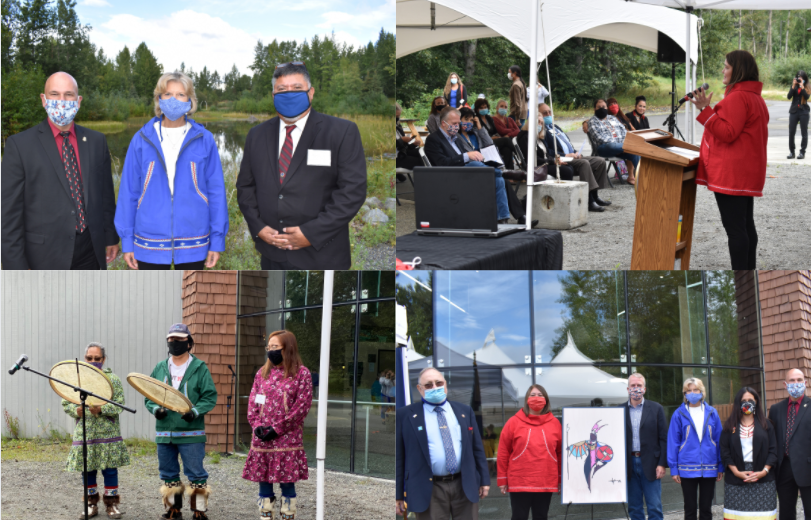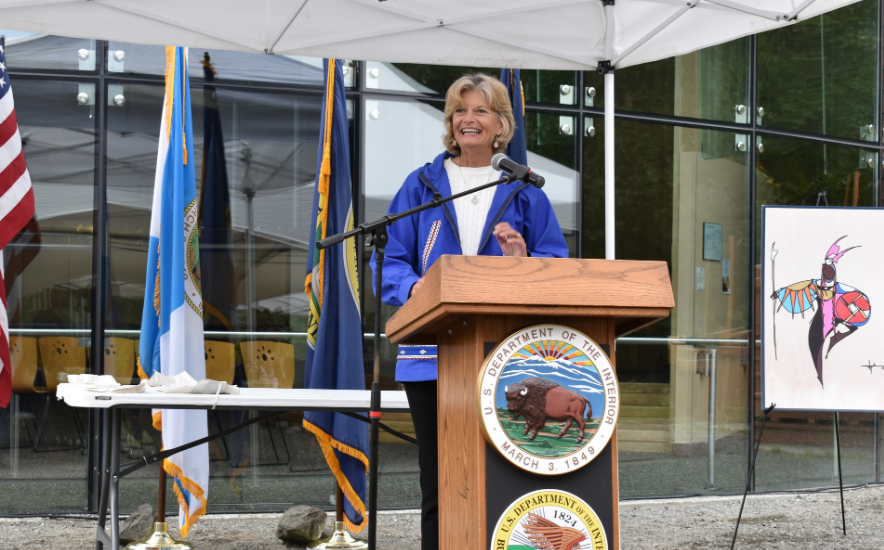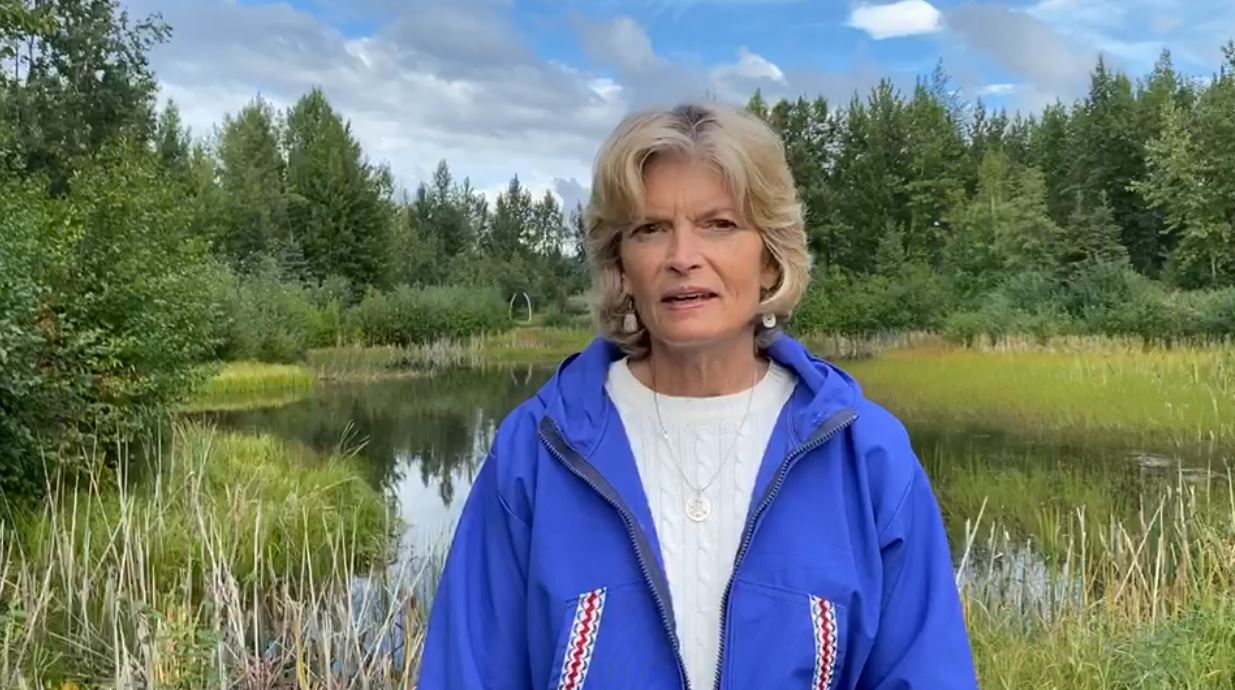ICYMI: Murkowski Attends Opening of Cold Case Office In Anchorage
Applauds Milestone As A Result Of Years-Long Effort To Address MMIW Crisis
U.S. Senator Lisa Murkowski (R-AK) joined other federal, state, tribal, and local leaders, for the official opening off the Operation Lady Justice Task Force Cold Case Office in Anchorage. The new office, which will be dedicated to solving cold cases involving missing and murdered American Indians and Alaska Natives, was secured through collaborative efforts between federal, state, local, and tribal leaders, including years of work by Senator Murkowski to address the nationwide crisis of missing, trafficked, and murdered Indigenous people.
Click here for video of Senator Murkowski speaking on the new Operation Lady Justice Cold Case Office in Anchorage.

Click here for more photos of the event.
The Anchorage office is one of seven of its kind being established across the nation to handle such cold cases and will be staffed by law enforcement, tribal law enforcement, special agents from the Bureau of Indian Affairs Office of Justice Services (BIA-OJS), as well as personnel from the Federal Bureau of Investigation and Offices of the U.S. Attorneys.

Click here for video of Senator Murkowski’s delivered remarks.
Speech Excerpts:
- “Our institutions have brought us to a place where Native people experience rates of homicide and have gone missing at alarming and awfully unacceptable rates. So we are here today to start building institutions that will help right the wrongs that so many Native family members have shared with us over the years.”
- “We know that one of the most vulnerable times for an Alaska Native woman is the transition from a village to a hub community, or to the city. We’ve heard from law enforcement that Native people, particularly young Native women, are targeted by traffickers when they first arrive in Anchorage or Fairbanks or in the hub communities. So it’s important that we both understand the scope of the problem and to address the coordination between state, federal, and tribal governments. And that is what we have heard from our federal partners here today.”
- “For the first time ever we have directed in a line item in our legislative appropriations, real dollars to prioritize this crisis of missing and murdered indigenous women. In FY 2020, our budget, we provided $6.5 million to address this crisis by providing support for cold case investigations, equipment, training, and background checks. And so a portion of that is being used for these Cold Case Task Force offices—both here in Anchorage as well as for the six others across the nation. So we’re making headway but there’s so much more that needs to be done.”
- “I am so heartened to see so many components of governments and individuals working together to turn the tide on this crisis and those who have come together today, each represent a role, a piece of the solution. It’s testament to the collaboration and a commitment. It’s testament we are moving beyond the awareness to the action.”
Timeline on Senator Murkowski’s Efforts:
- November, 2018 – The Senate Committee on Indian Affairs, of which Senator Murkowski is a member, passed the S. 1942, Savanna’s Act, sending it to the full Senate for consideration. Following the hearing, Senator Murkowski joined her Senate colleagues Senators Heitkamp (D-ND), Murray (D-WA), Cantwell (D-WA), Tester (D-MT) as well as Co-Authors of the UIHI report on Missing and Murdered Indigenous Women and Girls Annita Lucchesi and Abigail Echo-Hawk discuss the findings of a report prepared by the Seattle-based Urban Indian Health Institute (UIHI) which indicated the epidemic of violence against Missing and Murdered Indigenous Women and Girls initially believed to be confined to Indian Country, was far more reaching.
- April, 2019 – Senator Murkowski and Senator Cortez Masto (D-NV) introduced the Not Invisible Act, legislation aimed at addressing the crisis of missing, murdered, and trafficked Native people by engaging law enforcement, tribal leaders, federal partners, and service providers and improving coordination across federal agencies. Separately, Senators Murkowski and Cortez Masto reintroduced the Savanna’s Act, a bill to combat the epidemic of murdered and missing Native women and girls by improving the federal government's response to addressing the crisis.
- April, 2019 – Senator Murkowski called on Attorney General William Barr to work with her on addressing the issue of missing and murdered indigenous women and on tribal jurisdictional concerns. Attorney General Barr testified in a Commerce, Justice, Science Appropriations Subcommittee hearing examining the Fiscal Year 2020 budget request for the Justice Department. During the hearing, Murkowski raised the issue of protection for Alaska Native Villages in remote areas, and the need to expand tribal jurisdiction. This is the hearing AG Barr first announced he was planning to visit Alaska.
- June, 2019 – Senator Murkowski and U.S. Senator Dan Sullivan (R-AK) hosted U.S. Attorney General William Barr to Alaska for a visit focusing on law enforcement and public safety issues. During Attorney General Barr’s four-day trip, Senator Murkowski facilitated meetings in both Bethel and Napaskiak to emphasize the public safety challenges faced across Alaska due to the lack of local law enforcement as well as to help shed light on the severity of the issue of missing and murdered Native women and girls.
- June, 2019 – The Department of Justice (DOJ) announced that Attorney General Barr would declare a law enforcement emergency in rural Alaska under the Emergency Federal Law Enforcement Assistance Program today. Immediately following his announcement, $6 million was made available to the state of Alaska to support critical law enforcement needs of Alaska Native villages. The Attorney General also authorized additional funding to invest in victim services and village public safety. In total, the $10 million was invested in rural communities across the state.
- November, 2019 – Attorney General William Barr launched a national strategy to address missing and murdered Native Americans. The Missing and Murdered Indigenous Persons (MMIP) Initiative places MMIP coordinators in 11 U.S. Attorney’s offices who will develop protocols for a more coordinated law enforcement response to missing cases. The plan also called for the deployment of the FBI’s most advanced response capabilities when needed, improved data collection and analysis, and training to support local response efforts.
- November, 2019 – The Senate passed a funding package which included the Appropriations bills for Fiscal Year 2020 on Interior, Environment, and Related Agencies; and Commerce, Justice, Science which included funding secured by Senator Murkowski which would, for the first time, address the crisis of missing, trafficked, and murdered indigenous women. Specifically, $6.5 million is included for the Bureau of Indian Affairs (BIA) to take a comprehensive look at the issue across the BIA and Indian Health Service (IHS), which includes funding for cold case work, background checks, equipment needs, training, and a directive for the IHS regarding forensic training. The bill also included language directing coordination and data collection among Tribal, local, state, and federal law enforcement.
- November, 2019 – The Administration announced an Executive Order to enhance the operation of the criminal justice system and address the legitimate concerns of American Indian and Alaska Native communities regarding missing and murdered people — particularly missing and murdered indigenous people.
- December, 2019 – A funding bill with new investments secured by Senator Murkowski to address the crisis of missing, trafficked, and murdered Indigenous women was signed into law by the President.
- February, 2020 – Senator Murkowski helped lead a Capitol Hill briefing with U.S. Senator Cortez Masto (D-NV) on ways to increase the safety of Native women and address the crisis of missing and murdered Indigenous people. The briefing also covered other topics, including issues for PL 280 states, the implementation of 2013 special jurisdiction, and various pieces of legislation that Senator Murkowski has introduced to improve safety in rural Alaska.
- March, 2020 – Senator Murkowski applauded the Senate passage of two of her bills to address the crisis of missing, murdered, and trafficked Indigenous women. The bills, Savanna’s Act and Not Invisible Act, are both led by Senators Murkowski and Cortez Masto and aim to combat the epidemic by improving the federal government’s response through increased coordination, development of best practices, and creation of an advisory committee on violent crime.
- May, 2020 – Senator Murkowski joined U.S. Senator Steve Daines (R-MT) in introducing a resolution to designate May 5 as the National Day of Awareness for Missing and Murdered Indigenous Women and Girls. The resolution acknowledges the lack of data on the number of missing American Indian and Alaska Native women and calls upon Americans to commemorate the lives of those missing and murdered and to demonstrate solidarity with the families of victims in light of those tragedies.
- July, 2020 – The Administration announced a number of new Cold Case Task Force Offices for Missing and Murdered Natives would be established in Anchorage and across the nation.









